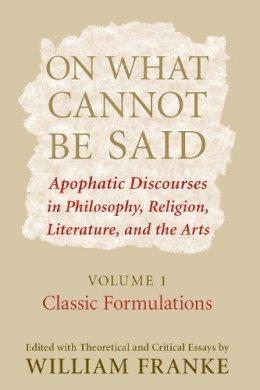10%OFF
Stock image for illustration purposes only - book cover, edition or condition may vary.
On What Cannot Be Said: Apophatic Discourses in Philosophy, Religion, Literature, and the Arts: Volume 1: Classic Formulations
Roger Hargreaves
FREE Delivery in Ireland
Description for On What Cannot Be Said: Apophatic Discourses in Philosophy, Religion, Literature, and the Arts: Volume 1: Classic Formulations
Paperback. Apophasis has become a major topic in the humanities, particularly in philosophy, religion, and literature. This two-volume anthology gathers together most of the important historical works on apophaticism and illustrates the diverse trajectories of apophatic discourse in ancient, modern, and postmodern times. Editor(s): Franke, William. Num Pages: 460 pages. BIC Classification: HRAB1; HRCM. Category: (UP) Postgraduate, Research & Scholarly. Dimension: 228 x 159 x 25. Weight in Grams: 567.
Apophasis has become a major topic in the humanities, particularly in philosophy, religion, and literature. This monumental two-volume anthology gathers together most of the important historical works on apophaticism and illustrates the diverse trajectories of apophatic discourse in ancient, modern, and postmodern times. William Franke provides a major introductory essay on apophaticism at the beginning of each volume, and shorter introductions to each anthology selection. The first volume, Classic Formulations, offers excerpts from Plato, Plotinus, Damascius, the Bible, Gregory of Nyssa, Augustine, Pseudo-Dionysius, Maimonides, Rumi, Thomas Aquinas, Marguerite Porete, Dante, Teresa of Ávila, John of the Cross, and more.
Product Details
Publisher
University of Notre Dame Press
Place of Publication
Notre Dame IN, United States
Shipping Time
Usually ships in 7 to 11 working days
About Roger Hargreaves
William P. Franke is professor of comparative literature and religious studies at Vanderbilt University and past professor of philosophy and religions at the University of Macao (2013–16). He is a research fellow of the Alexander von Humboldt-Stiftung and has been Fulbright-University of Salzburg Distinguished Chair in Intercultural Theology and Study of Religions. He is the author of A Philosophy of ... Read morethe Unsayable (University of Notre Dame Press, 2014). Show Less
Reviews for On What Cannot Be Said: Apophatic Discourses in Philosophy, Religion, Literature, and the Arts: Volume 1: Classic Formulations
“Any writer worth his salt knows that what cannot be spoken is ultimately the thing worth speaking about; yet most often this humbling awareness is unsaid or covered up. There are some who have made it their business, however, to court failure and acknowledge defeat, to explore the impasse of words before silence. William Franke has created an anthology of ... Read moresuch explorations, undertaken in poetry and prose, that stretches from Plato to the present. Whether the subject of discourse is All or Nothing does not matter: the struggle of speech to name the unnameable is the same. This ambitious two-volume undertaking demonstrates a preoccupation as old as Western civilization itself: the limits of language and the virtue of being at a loss for words. How long we have been raiding the Inarticulate!” —Peter S. Hawkins, Boston University “Developments in critical theory during the past two decades have led to renewed interest in negative theology. Books like Languages of the Unsayable (1989), Negation and Theology (1992), Derrida and Negative Theology (1992), and The Otherness of God (1998) have signaled the resurgence of this ancient tradition. William Franke’s distinctive contribution is to provide the background and texts from which these recent developments have emerged.” —Mark Taylor, Williams College "These two volumes successfully realize a massive project: to propose and delineate a new field of discourse that provides a fresh approach to Western thought as a whole. In short, William Franke demonstrates the centrality of apophaticism, 'what cannot be said,' to the Western tradition, from Plato (and before) to Derrida (and beyond). . . . The first volume covers the first 'cycles' of apophasis, as the Western tradition evolves, stretching from the commentary tradition of Plato's Parmenides to Eckhart and his progenitors. . . . Franke's work is nothing short of brilliant." —Religion and Literature “. . . one of the most important and original contributions to the discussion of apophasis in recent years. . . . Franke’s historical and disciplinary range, in light of his well-written and compelling essays, provides an illuminating insight into the pervasiveness of apophatic discourse. . . . Franke’s anthology is a resource which should not be ignored. Few others, maybe no others, provide the same clarity, coherence, and scope.” —Christianity and Literature “The genius of Franke’s two-volume critical anthology on apophatic discourses is the work’s breadth and depth of engagement with the concept in variously distinct and even conflicting contexts. . . . Franke manages his sweeping and inclusive exploration of apophatic discourses by identifying a thematic lens for selecting his sources as part of a larger, conceptually-rooted genre of discourse. . . . the greatest strength of Franke’s two-volume collection resides in the sheer fact that nothing like it exists.” —Essays in Philosophy Show Less

